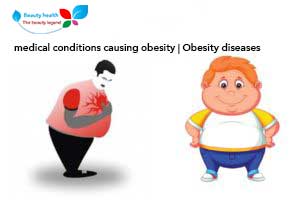medical conditions causing obesity | Obesity diseases
medical conditions causing obesity | Obesity diseases:
medical conditions causing obesity | Obesity diseases , What are the causes of obesity, and what are the ways to treat it? What are the diseases caused by obesity? And how to treat obesity? And how does obesity affect the body? And how can you prevent obesity? What is the best way to lose weight and burn fat ?
Writing a topic about obesity and overweight needs more than one article, but today we have summarized for you the most important symptoms of obesity and the types of obesity that affect humans, and what are the causes of obesity in women more than men? How can obesity be treated in girls, boys and adults?
definition of obesity
Obesity can be defined as an increase in body fat that may cause health damage.
- Obesity occurs when the size and number of adipocytes increases in the body.
- A normal-sized person also has about 30-35 billion adipocytes.
- When a person gains weight, these fat cells increase in size first and then number.
- The opposite occurs when a person begins to lose weight, the size of adipocytes decreases, but their number remains the same in general.
- This is part of the reason why losing weight is difficult once a person has gained a certain amount of weight.
- But fat cells can be destroyed by certain devices or drugs.
medical conditions causing obesity:
medical conditions causing obesity are diverse, some of which are due to the diet, and these can be controlled, and some are due to external factors that are difficult to control. For this reason, the types of obesity are classified into:
medical conditions causing obesity of poor diet:
- Eating more calories than you burn in daily activity and exercise – on a long-term basis – can lead to obesity.
- These extra calories also accumulate and cause weight gain, but it is not related to calories
- As the adoption of a sedentary lifestyle can be the main cause of obesity in addition to the increase in accumulated calories.
medical conditions causing obesity by things beyond human control:
There are also other causes that cannot be controlled, including the following:
- Genes: affect how your body processes food into energy and how it stores fat.
- Age: Getting older plays a role in decreasing muscle mass, slowing metabolism, and making weight gain easier.
- Lack of sleep: Lack of sleep may lead to hormonal changes that make you feel more hungry and crave some high-calorie foods.
- Pregnancy: It becomes difficult to lose weight gained during pregnancy and may eventually lead to obesity.
medical conditions causing obesity by diseases:
Some health conditions can also lead to weight gain, which leads to obesity, and these cases include the following:
- Polycystic ovary syndrome: a condition that causes an imbalance in the female reproductive hormones.
- Pradrulli syndrome: a rare condition that appears at birth and causes excessive hunger.
- High cortisol (Cushing’s syndrome): This is a rare condition that increases your level of stress.
- Hypothyroidism: A condition in which the thyroid gland does not produce enough of some important hormones.
- Osteoporosis: A condition that causes pain that may lead to decreased activity.
Obesity treatment:
Different types of obesity can be treated by following a diet to lose weight, and if this fails, liposuction is used:
- If you are obese and cannot lose weight on your own, medical help is available.
- Start with your primary care doctor and then you may be referred to a dietitian or health care staff.
- Your doctor will also work with you to make the necessary lifestyle changes, but in some cases medications or weight loss surgery may be given.
What are the diseases caused by obesity?
Obesity can lead to more than just being overweight. Having a high percentage of body fat or muscle can strain your bones as well as your internal organs. Excess weight increases inflammation in the body, which is a risk factor for cancer. Obesity is one of the major risk factors for type 2 diabetes.
Obesity has been linked to a number of health complications, some of which can be life-threatening if not treated, and include the following:
- Type 2 diabetes mellitus .
- Heart disease .
- high blood pressure
- Some types of cancer (breast, colon, uterine).
- brain attack .
- Gallbladder diseases.
- Disease liver fatty.
- High in fat.
- Sleep apnea and other breathing problems.
- Arthritis.
- infertility .
Obesity treatment:
Obesity treatment often requires surgery:
- Many people and doctors have tried to find successful solutions to treat obesity and get rid of excess weight.
- As sometimes some patients have succeeded in treating obesity by exercising and following healthy diets, but many face a problem in treating obesity by these means despite their commitment to it.
- Some may also want quick and less effort solutions to get rid of this extra weight, and that is why they may resort to various types of surgeries to obtain the desired results.
Medicines that are prescribed to help treat obesity:
Medications are usually prescribed if other methods of losing weight have not worked, if you have a BMI of 27.0 or more and you have health problems related to obesity.
Also, these medicines often prevent the absorption of fats or suppress appetite. These medicines include the following:
- Phentermine/topiramate (Qsymia).
- naltrexone/bupropene (Contriv).
- Liraglo Ted (Saxenda).
- orlistat;
How can you prevent obesity and obesity diseases?
On a personal level, you can help prevent overweight and obesity by making healthy lifestyle choices that include:
- Do moderate exercise such as walking, swimming or cycling for 20-30 minutes every day
- Eat well by choosing nutritious foods like fruits, vegetables and whole grains
- Eat foods rich in fat and calories in moderation.
What are the effects of obesity on the body that lead to obesity?
Obesity diseases and their effects on the body include the following:
- Nervous system.
- The weight gain or obesity increases the risk of stroke, which stops the flow of blood to the brain.
- Respiratory system.
- The fat stored around the neck can make the airway very small, as well as making it difficult to breathe at night.
- Digestive.
- Obesity is associated with an increased risk of gastroesophageal reflux disease (GERD), which occurs when stomach acid leaks into the esophagus.
- The risk of developing gallstones also increases, and this occurs when bile builds up and the gallbladder hardens.
- Cardiovascular and endocrine system.
- In people who are obese, the heart needs to work hard to pump blood around the body.
- It also leads to high blood pressure, which is the main cause of stroke.
- Obesity can also make the cells of the body resistant to insulin, which leads to diabetes.
- Reproductive system.
- Obesity can prevent a woman from getting pregnant and can increase her risk of complications during pregnancy.
- Skeletal and muscular systems.
- Obesity can cause deterioration in bone density and muscle mass, and can lead to an increased risk of fractures.
- Obesity can also lead to increased pressure on the joints, leading to pain and stiffness.






